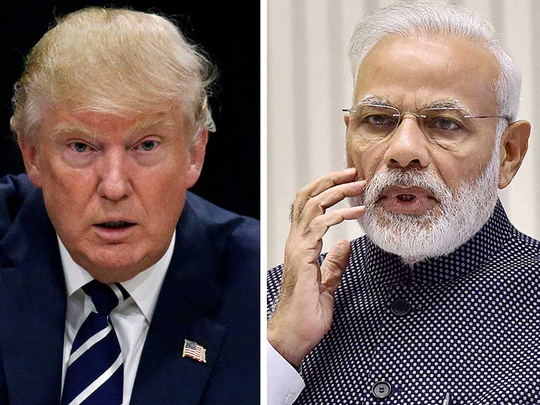
I am a big fan of Hindu, shouted Donald Trump at an Indian-American event organised by the Republican Hindu Coalition in New Jersey. Seconds later, he promptly declared himself a fan of India’s nationalist Prime Minister Narendra Modi. Trump seemed to enmesh the faith with the Nation and to some Indian ears it sounded as though he was a fan of the venerable newspaper Hindu. The New York Times, which ran the story, however, chose to disentangle Trump’s utterance and wrote ‘He is a big fan of the Hindus’.
Back in India, the Hindu Sena or the Hindu Army congregated at Jantar Mantar — the speakers’ corner in New Delhi — to celebrate Trump’s victory and hailed his stand on terror. Notwithstanding the raucous support, drums banging and the speakers blaring with Bollywood songs, the fact is Hindu Sena is a fringe group and it pales in comparison to Hillary Clinton’s long association with India, dating back to the presidency of Bill Clinton. But here again Trump stole a march on her for one of Hillary’s closest backers is Sant Singh Chatwal, an Indian-American hotel and restaurant owner with a shady background. Chatwal pleaded guilty in a straw donor scheme and barely escaped prison sentence and this played into the narrative of “crooked Hillary” — a catchy slogan that seems to have resonated with a large swathe of Americans, even those who were not Trump supporters.
Undoubtedly the Hindu Sena is a fringe group, but some of its demands like a stricter control of the Indo-Bangladesh border, the push-back of Bangladeshi immigrants and building a wall to staunch this endless flow of illegals into India sound similar to Trump’s Mexican wall. Indeed Trump’s reprehensible categorisation of Mexicans as rapists and criminals is music to the ears of the Hindu right in India, who have, in the past, termed Bangladeshi illegals as vermins. Indeed even Modi during his 2014 campaign trail in Assam said: “I want to warn ... after May 16 ... I will send these Bangladeshis beyond the border with their bags and baggages”. Instant deportation of illegal Bangladeshis was very much a part of his campaign rhetoric.
Trump’s victory has drawn contrasting headlines in India. ‘A Trump Presidency will be a blow to India on many counts’ said the Wire, while the Economic Times said President Trump will be good for India and bad for China and Pakistan. A few days later, the same paper ran a story to declare that Trump’s rise deals another blow to India’s manufacturing dream — the end of India’s ambition to become a factory of the world. Reducing to a mere slogan Modi’s famed exhortation “Make in India”, should Trump carry out his threat to stop imports and outsourcing.
Such opposing commentary is indicative of how it is far too early to draw any definitive conclusion on the impact of the recent happenings in Washington, but Trump is a maverick and prudence demands that India’s policy-makers plan for the unexpected.
To be fair, though, Trump has repeatedly hailed Modi’s work to reform India and more importantly the Republican Party has generally been sympathetic towards India’s quest for military hardware and nuclear parity with China. Former US president George W. Bush may be unpopular and irrelevant in the US, but back in India, he is considered a close friend for having brokered the Indo–US nuclear deal in 2005. Speculative stories emanating out of the Washington beltway have thrown up names like Nikki Haley, the two-term governor of South Carolina for US Secretary of State — a huge stretch, given that she is a novice on foreign-policy matters, but from an outlier like Trump, expect the unexpected.
These musings should not hold us for long for it is the rise of populism in the US under Trump and India’s own brand of populism under Modi that is worthy of scrutiny.
Project Syndicate recently ran a lengthy comment piece titled ‘Is populism being Trumped’ and it was written before the stunning upset victory of Trump. It axiomatically assumed a Clinton Presidency and argued ‘Is the populist tide going out? So much for punditry and the polls getting it horribly wrong, this essay did have some pithy remarks by Harvard’s Joseph S. Nye that deserves our undivided attention. He said: “Be wary of attributing populism solely to economic distress”, after which, in a critical follow-up, he cited cultural backlash as being more important for the rise of populism.
Indeed the seismic shift in Modi’s India, wherein Hindu nationalism is a badge of honour, ties in with Nye’s remarks about culture being at the very heart of this populist upsurge, because it is India’s middle class that is Modi’s staunchest follower — not its poor. And this populism is part of a wider trend stretching from the United Kingdom and its Brexit movement to Hungarian Prime Minister Viktor Orban’s anti-immigrant policies, to Poland’s Jarslow Kaczynski’s identity politics.
Trump’s knowledge of India maybe abysmal, but his fulsome praise of Modi and the bi-partisan support for India in the US Congress, may see a huge upswing in Indo-US relations.
Ravi Menon is a Dubai-based writer, working on a series of essays on India and on a public service initiative called India Talks.










